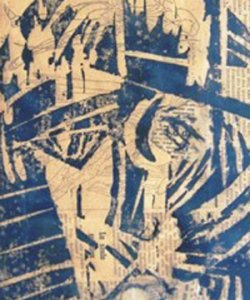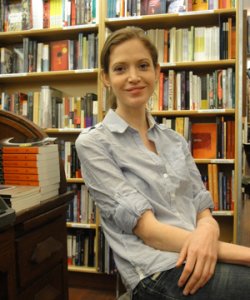New Tree-Free Submission Services
In the past year several new electronic-submission systems have emerged, among them Submishmash, Green Submissions, and Tell It Slant, enabling journal editors to manage writer's work more efficiently.
Jump to navigation Skip to content
Articles from Poet & Writers Magazine include material from the print edition plus exclusive online-only material.
In the past year several new electronic-submission systems have emerged, among them Submishmash, Green Submissions, and Tell It Slant, enabling journal editors to manage writer's work more efficiently.
With so many good books being published every month, some literary titles worth exploring can get lost in the stacks. Page One offers the first lines of a dozen recently released books, including Maxine Hong Kingston's I Love a Broad Margin to My Life and Michael McClure's Of Indigo and Saffron, as the starting point for a closer look at these new and noteworthy titles.

A pen-and-ink drawing and a typewritten letter by Charles Bukowski are two pieces among the documents and ephemera currently on view in Charles Bukowski: Poet on the Edge at the Huntington Library in San Marino, California.
Literary MagNet chronicles the start-ups and closures, successes and failures, anniversaries and accolades, changes of editorship and special issues—in short, the news and trends—of literary magazines in America. This issue's MagNet features ZYZZYVA, Cave Wall, Annalemma, H.O.W. Journal, Assembly, and the Whitefish Review.
Small Press Points highlights the happenings of the small press players. This issue features Solid Objects, the New York City–based independent press that publishes "short, self-contained works that might not otherwise find their way into book form because of their length."
With so many good books being published every month, some literary titles worth exploring can get lost in the stacks. Page One offers the first lines of a dozen recently released books, including Leslie Marmon Silko's The Turquoise Ledge and Julia Franck's The Blindness of the Heart, as the starting point for a closer look at these new and noteworthy titles.
A look at the retro text editors and Web applications that more and more writers are using to roll back the reach of new media.
The Virginia Quarterly Review was rocked by the July 30 suicide of its managing editor, Kevin Morrissey, leaving the award-winning magazine’s future in doubt, as well as that of its editor.
Small Press Points highlights the happenings of the small press players. This issue features Sidebrow, the San Francisco–based independent press that publishes "works by multiple authors who aren’t timid about crossing genre boundaries."

Portraits of Henry Miller “as a demon” and Guillaume Apollinaire, two of the thirty pieces featured in Beyond the Words: Author Portraits by Carl Köhler, currently on exhibit at the University of Chicago’s Joseph Regenstein Library.

In the sixth installment of our series Inside Indie Bookstores, contributor Jeremiah Chamberlin travels to New York City to speak with Sarah McNally, owner of McNally Jackson Books.
The new Lit Mag Adoption Program is designed to introduce journals into creative writing course curricula and engage student writers as readers and members of a national literary community.
Literary MagNet chronicles the start-ups and closures, successes and failures, anniversaries and accolades, changes of editorship and special issues—in short, the news and trends—of literary magazines in America. This issue's MagNet features Pleiades, Nashville Review, Sycamore Review, One Story, the Oxford American, the Awakenings Review, Fairy Tale Review, and Bound Off.

Staring down a disorder that prevents her from recognizing faces offers ample material for a memoir, but Heather Sellers tackles much more in You Don't Look Like Anyone I Know.
A survey of professional opinions, including those of the New Yorker's Paul Muldoon and the Southern Review's Jeanne Leiby, about the Paris Review's decision to reject previously accepted poems.

Contributor Jeremiah Chamberlin profiles indie innovator Dzanc Books, which in four short years has gone from a start-up to a publisher with five imprints, three literary magazines, and a list of over fifty titles.

When is the best time in your career to look for representation, and when should you call off an author-agent relationship? Terra Chalberg, whose clients include Lori Ostlund and Glenn Taylor, tackles these questions and more.
Moving into new poetic territory, Major Jackson, in his third collection, Holding Company, corrals the ecstatic in a ten-line form.
The top ten low-residency MFA programs in the United States, plus a ranking of the additional thirty-six low residencies in the United States and beyond.
A combination of hard data from programs that release funding and admissions figures to the public and a vital survey of what the individuals comprising the next generation of U.S. poets and writers have to say about their own priorities in choosing a postgraduate program, here is a ranking of the nation's top fifty MFA programs.

In the fifth installment of our series Inside Indie Bookstores, contributor Jeremiah Chamberlin travels to Denver to speak with Joyce Meskis, owner of Tattered Cover Book Store.
In response to the Deep-water Horizon oil spill, writers Heidi Lynn Staples and Amy King created Poets for Living Waters, an online poetry forum featuring works written in response to the disaster, spurring a host of nationwide events that give poets not only an opportunity to take action against the catastrophe but also to speak out in support of our natural environment.
Despite the financial challenges of their vocation, writers have long found accessible, inventive ways to get work into the world. Among the benefit readings and bake sales, a new fund-raising option allows writers to tap into the fertile social networking landscape to find individuals who may be willing to donate the cost of a cupcake to give a project a boost.
With so many good books being published every month, some literary titles worth exploring can get lost in the stacks. Page One offers the first lines of a dozen recently released books, including Paul Murray's Skippy Dies and Ai's No Surrender, as the starting point for a closer look at these new and noteworthy titles.